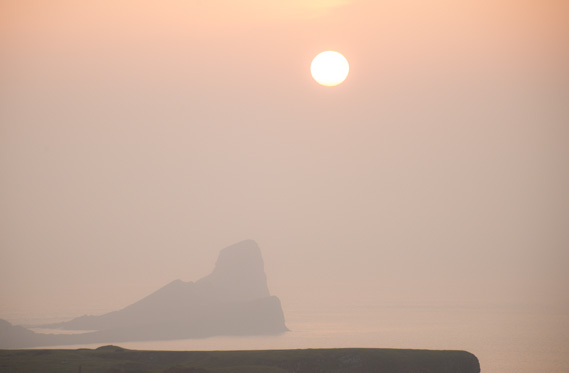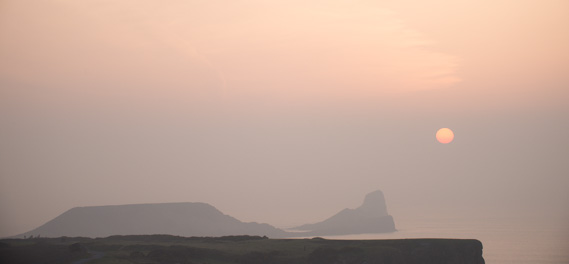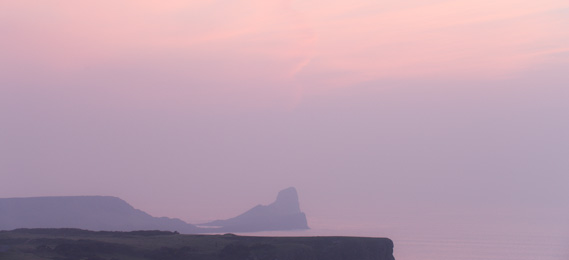
Just three images on this post and a sad reflection of where photography education may be going.
These images were taken on Gower at Rossili last week as the sun dropped through a low bank of cloud and then disappeared altogether leaving a beautiful subtle light with pastel like shades.
Is this too romantic a view of the world? Is there any room left for beauty within photography? There seems to be a sad move away from anything that even hints at the sublime. We don’t seem capable anymore of dealing with a pure aesthetic that celebrates a natural phenomenon.

What’s wrong with beauty?
This was brought home to me when making these images. There was a group of photography undergraduates who had come to Rossili that evening from the south of England. I have no idea what their remit was or what they may have been there to photograph but whilst I was quietly immersed in the moment two students passed by.
They were not loud, unpleasant or spoiling the moment but it was what one said to the other that struck home, “If there’s one thing that three years at university has taught me it’s never to take a sunset” They carried on their way obviously aware of what was happening in front of them but not feeling able to engage in the moment for fear of how it would be perceived in the avant-garde world of current art practice. It seems ignoring sunsets and beauty is becoming very much de rigueur and that’s a worry as we lose touch with who we are and what’s really important.


Never mind , some people walk round with their eyes open and see nothing !
Their loss.
Very sad situation Tim, do you think they are in the right profession.
Oh dear, lets change that then at least in Cardiff of the next decade
Of = over
Staggering – almost unbelievable. How can anyone with a camera wander about totally oblivious of the beauty around them – or, at least if not oblivious too, unaware of it’s photographability (now there’s a word!!).
Thanks all for the comments.
Its a pressure on them born of not wanting to be cliched, which is a real shame. Photography is many things to many people but to feel restricted as to what you can and can not take is not what we should be encouraging.
Through dealing with the cliche, but in our own way is often how we develop. Images of sunsets fall into the cliche bracket not the sunset itself, which simply occurs everyday of every year. So we need to encourage students to find ways of imaging such common occurrences in their own way and never to be afraid of being seen to turn their camera in the direction of such things.
There’s also a bigger issue and that is the the denial of beauty, but that’s for another time!
During our induction to second year we were given a list of things not to photograph by our lecturers. This list included Skateboarding, Surfboarding, Mining and Sunsets. I studied in Cornwall. Need I say anymore?
Our lecturers then showed us work by the previous year’s students. The highest first awarded on our course (at that time) was a project on Mining in South Crofty, the second highest grade ever awarded was around Skateboarding or Surfing (I can’t quite recall which).
We were.. well, we were pissed off to say the least and voiced our concerns. Collectively, as a year group, we challenged the lecturers on the list and asked why we were being told not to photograph subjects which in the past had gained students remarkably high grades (and that were all around us in Cornwall). They shrugged it off and told us not to worry, the list was only in jest and although we could photograph those subjects if we wanted to they just wanted us to be aware that they had been shot numerous times.
I think one person photographed a subject slightly related to a topic on that list in our year.
During second year we were not encouraged to shoot anything which had been shot by a student before us. Our course was only 4 years old at the time, what happens when its 10 years, 15.. 20? What the hell will people be photographing?
I can see where those students that you overheard are coming from- I probably would never have handed in a photograph of a sunset in my final edit in uni because of the taboo surrounding doing so (that really was created by our lecturers) but I will always photograph a beautiful sunset, for myself if no one else.
And I won’t start on the denial of beauty within photography Dad, I may never stop typing!
… and it’s the taboo that’s worrying – I can understand it from a students point of view, but it’s being forced on them by as you say the lecturers. If it’s been photographed before, as virtually everything has, then two things are relevant.
1. If it’s the first time you may have photographed it then it’s a new experience to you and what you get out of it is new both emotionally and spiritually.
2. If you feel ‘it’s been done before’ because it has, then do something else with it – find your way of responding to it but don’t simply ignore it.
So, would it be OK to photograph Sunrises then !! Ha
Sunrises don’t seem to have the same taboo surrounding them- maybe its because you have to get up so early to see them! I was sitting outside the Hotel de Sal on the Salar de Uyuni in Bolivia a couple of days ago, watching the sun set on an incredible landscape. With all the tourists who pass by I’m sure that scene has been photographed a million times, but I still had my camera around my neck, photographing as the last of the light disappeared. I swapped between my standard lens and the longer lens and tried a few more abstract shots too. I would never have dreamt of not photographing such a beautiful sunset, no matter how many have come before me and done the same!!
I’m afraid that in part I have to agree with the students on this. While I find immense pleasure in sunsets and natural beauty I usually find vey little pleasure in photographs of such things and it’s probably in some part down to the role of photography de-sensitising sensitive situations. It’s the same as if I came across a starving child, i would rightly be upset and want to do all that was possible to help, but a photograph of a starving child has long since lost its role as money raiser.
Unfortunately the students probably don’t understand why they’ve been asked to photograph or not photograph certain things as it’s not been explained to them while the more likely scenario is that the tutors are sick to death of seeing a different version of the same thing week in week out.
I understand where you’re coming from here but I think it’s a responsibility of all tutors to let the students find their own voice and how they respond to such things. De-sensitivity of certain subjects has definitely occurred and maybe we need to reassess the role photography has in how we respond to such images as sunsets and starving children.
I also think that tutors need to realise that most things have been photographed but for a young aspiring photographer it could well be the first time they have lifted up a camera to such things and are thus seeing it a fresh. We should open the debate about how such images are read but we should certainly not discourage them from confronting them.
Thanks for continuing the debate, much appreciated.
Very true and sad. One has to just view work posted in an international and they will soon realise that the norm has become to snap in the field, manipulate at home. True field photographers are becoming rare it seems whereas digital manipulators are becoming common. I think mainly because people prefer to stay at home and play on their computer.